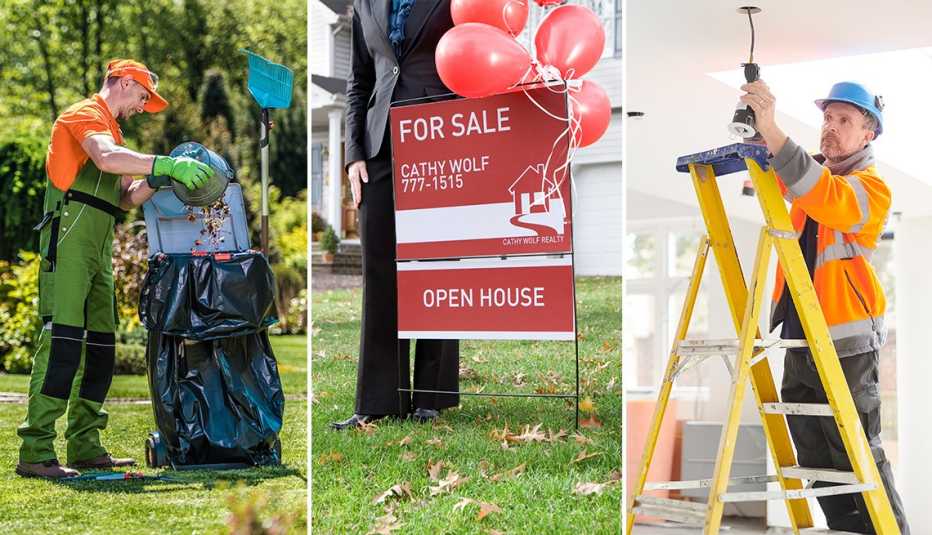AARP Hearing Center


Maybe it’s temporary, maybe it’s permanent. But as of this moment, almost every aspect of being a consumer is topsy-turvy: Prices are soaring, hired help is hard to find, supplies are back-ordered, deliveries are delayed, and yet demand for goods and services — especially those related to your home — keeps going up and up. How do you get the home projects or work done that you want in such an environment, at a cost that’s reasonable?
Here are some tips and approaches to help you find the right people to keep your home in tip-top shape during these challenging times.
Find the best home remodeler
Home remodeling has become even more of a challenge since the pandemic. Not only do remodelers face a labor shortage and high demand for their services (up roughly 25 percent since 2020 for Steve Cunningham, owner of Cunningham Contracting in Williamsburg, Virginia), but so do the subcontractors (electricians, carpenters, painters, tile specialists and so on) that remodelers bring to a job. Add to that supply-chain disruptions that can slow delivery of materials such as lumber, windows and appliances to a crawl. “I just ordered a garage door for a job that will take 15 weeks to deliver,” says Mike Williams, owner of Maryland Professional Contractors. “Cabinets can take two months from some suppliers.” All of this is boosting prices to eye-watering levels (lumber costs jumped 218 percent in just five months in early 2022, according to the National Association of Home Builders). Be patient, because finding an honest, experienced pro has never mattered more. Here’s how.
Bias toward referrals. Remodelers are so busy that without a referral from a satisfied customer or another contractor, you may not even get an estimate, Williams says. “My volume is up 40 percent,” he says. “So my business plan is to stick with referrals. If you know somebody who knows a contractor they liked, that will help you get an estimate.”
Ask smart questions. When you talk with friends, neighbors and coworkers about contractors, be sure to ask the difficult questions: What part of the project didn’t go as planned, suggests Sal Alfano, retired executive editor of Professional Remodeler magazine. Delays and budget changes are typical, but did the remodeler explain them honestly as soon as they cropped up? Did he give you excuses? Or did he constructively discuss options?
Find out who’ll actually do the work. Will the guy you hired be on the job? Who are the subcontractors that will get used, and do they have required licenses and insurance? Ask a potential remodeler if he uses the same subcontractors on every job, and if he is sure they aren’t bogged down with backlogs, Cunningham suggests.
Look for connections. A remodeler with several years’ experience may have the supplier relationships and know-how to help get materials as quickly as possible, Cunningham says. Some have staffers who will go with you to pick out everything from paint and tile to washing machines and faucets.
Check their credentials. In ultra-busy times like these, less-than-reputable players emerge. Check online to see if your state requires contractors to have a home-improvement license or registration. If so, ask your remodeler for proof. Also ask for proof of insurance and certification by a professional organization, Alfano suggests. A contractor with extra certifications and credentials in specialty areas is someone who values ongoing, advanced training, Cunningham says.
Find the best real estate agent
Shocking fact: As of February, there were far more Realtors in America than homes for sale. This imbalance — the result of fewer homeowners looking to sell and a surge of workers changing careers to become real estate agents — means you have your pick of agents. To find the best one, you have to know how to get them to reveal their skill sets, says Ken H. Johnson, a real estate economist and associate dean at Florida Atlantic University’s College of Business. What you’re looking for, whether buying or selling: a great track record, intimate knowledge of the market, trustworthiness, and the ability to listen carefully and fully to your needs and concerns, says Clare Trapasso, deputy news editor for Realtor.com.
Start with word of mouth. Ask friends and neighbors who they used when they bought or sold a house locally. Did the agent really listen to their needs and concerns and work actively to show them houses that filled the bill? Or did they try to sell them the wrong properties? Then check online lists and ratings. If you’re moving to an area where you don’t know anyone local to ask, several websites list agents by neighborhood; consider Realtor.com, HomeLight.com or Zillow.com.



































































More on Home and Family
The Ultimate Guide to Financial Advisers
Get the right expert for the right advice
10 DIY Home Improvements For a Fresh Look
Simple projects that revitalize your living space
5 Home Improvements That Pay Off at Resale
Even in a strong real estate market, getting top dollar requires upgrades